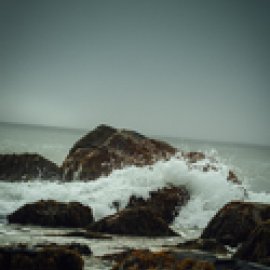RESCUE, part 10: UNCLOS and Biological Diversity
-
English
-
ListenPause
intro music
Welcome to World Ocean Radio…
I’m Peter Neill, Director of the World Ocean Observatory.
One of the greatest concerns with the enforcement of the United Nations Convention of the Law of the Sea has been the definition and enforcement of protections of ocean biodiversity outside limits of national jurisdiction. Just last week, at the UN in New York, after some ten years of negotiation, an adjunct agreement was reached to address that particular area that entails the true asset value of the ocean commons and has been threatened by pollution, acidification, indiscriminate harvest of fish toward extinction, illegal practices and human rights abuses, the threat of deep sea mining, and the exploitation of marine species as intellectual property in the form of genetic value and organisms exploited by patent for private profit.
The global ocean community has experienced a paroxysm of celebration and congratulation, and indeed, many organizations and many individuals have invested endless hours of negotiation and draft exchanges to reach some compromise that might be acceptable to all interests, particularly the 60 government ratifications required for the agreement to come into force. It becomes yet another tool for the global community to work toward conservation and protection of the vast resource that is the ocean for the survival of all mankind.
This morning I consumed the 54-page document in its entirety—its articles of provision, its definitions, its administrative organization, its process for application, environmental evaluation, and its review by professional committees, approvals, surveillance, enforcement, and operational controls. Most of the content pertains to process and I began to wonder where the true value lies as justification for the decade of work and celebration.
There appear to be four main elements contained therein. First, there is an articulated program for definition in advance, application, review, performance, evaluation, communication, and distribution of information derived from research expeditions. This process includes a central authority and repository for all the assembled materials and outcomes.
Second, there is an established system for monetary valuation, collection of dues, grants, dispensation of royalties, and other financial outcomes derived from the research from initial investigation to profits ultimately paid. Third, there is the creation of a system for financial renewal through which such incomes are designated to assist developing coastal or landlocked nations to afford local engagement, investment, and capacity. And fourth, there is proposed a system of governance, future meetings, standing committees, and other administrative practices to oversee results, adjust or advance changes, and otherwise drive forward and sustain the combined effort and its success.
So, what we have here, and what the ocean apparat has so enthusiastically embraced, is a consensus agreement for oversight and implementation of the investigative and commercial applications of scientific and entrepreneurial return from research in the ocean commons, worldwide, from seafloor and below, to water column and above, of the marine plants and animals, known and unknown, otherwise vulnerable to unrestricted, unregulated exploitation without limit.
There are “ifs” to be met by this victory: if the instrument is ratified; if the structure and capacity can be built in time; if public and private finance plays by the new rules; if the conventional paradigm of profit first at any cost is ameliorated by determinant principles of precaution and polluter pays; if an integrated ecosystem management approach, can be applied; if indigenous participation and knowledge is respected and included; if there can be equitable sharing of scientific and intellectual property; and if the acceptance of the ocean is a primary scape for the common heritage of all mankind can be declared central to our plan for RESCUE: R for renewal, E for environment, S for society, C for collaboration, U for understanding, and E for engagement.
We discuss these issues, and more, in future editions of World Ocean Radio.
World Ocean Radio is distributed by the Public Radio Exchange and the Pacifica Network in collaboration with WERU FM in Blue Hill, Maine. Find us wherever you listen to podcasts and at world ocean observatory dot org, where World Ocean Radio episodes are now searchable by theme. Find the RESCUE series by clicking on the “Solutions” banner.
outro music
This week we continue the multi-part RESCUE series with a continuation of UNCLOS, the United Nations Convention on the Law of the Sea. In early March, the UN finalized a consensus agreement to work toward the conservation and protection of ocean resources and ecosystems. RESCUE as an acronym offers a plan for specific action and public participation: Renewal, Environment, Society, Collaboration, Understanding, and Engagement.
About World Ocean Radio
5-minute weekly insights dive into ocean science, advocacy and education hosted by Peter Neill, lifelong ocean advocate and maritime expert. Episodes offer perspectives on global ocean issues and viable solutions, and celebrate exemplary projects. Available for syndicated use at no cost by college and community radio stations worldwide.
Image
Photo by Tim Foster on Unsplash
@timberfoster
- Login to post comments



